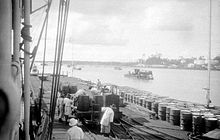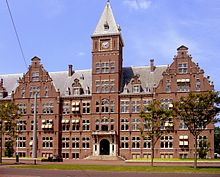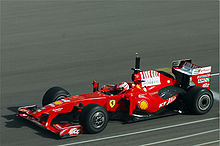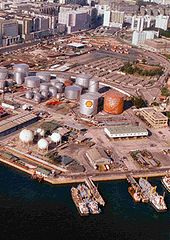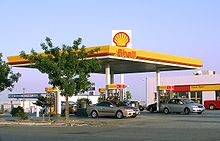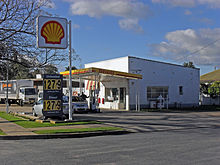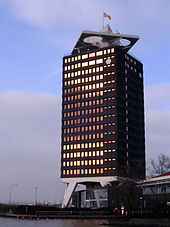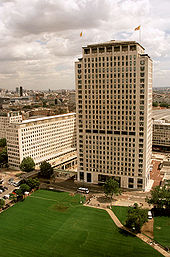- Royal Dutch Shell
-
Royal Dutch Shell plc 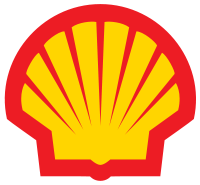
Type Public limited company Traded as LSE: RDSA, RDSB
Euronext: RDSA, RDSB
NYSE: RDS.A, RDS.BIndustry Oil and gas Founded 1907 Headquarters The Hague, Netherlands
(Headquarters)
Shell Centre,
London, United Kingdom
(Registered office)Area served Worldwide Key people Peter Voser
(CEO)
Jorma Ollila
(Chairman)Products Petroleum, natural gas, and other petrochemicals Revenue  US$ 368.056 billion (2010)[1]
US$ 368.056 billion (2010)[1]Operating income  US$ 35.344 billion (2010)[1]
US$ 35.344 billion (2010)[1]Profit  US$ 20.474 billion (2010)[1]
US$ 20.474 billion (2010)[1]Total assets  US$ 322.560 billion (2010)
US$ 322.560 billion (2010)Total equity  US$ 148.013 billion (2010)
US$ 148.013 billion (2010)Employees 101,000 Subsidiaries Website Shell.com Royal Dutch Shell plc (LSE: RDSA, RDSB), commonly known as Shell, is a global oil and gas company headquartered in The Hague, Netherlands and with its registered office in London, United Kingdom.[2] It is the fifth-largest company in the world (and the second-largest energy company) according to a composite measure by Forbes magazine and one of the six oil and gas "supermajors".[3][4] It is vertically integrated and is active in every area of the oil and gas industry, including exploration and production, refining, distribution and marketing, petrochemicals, power generation and trading. It also has major renewable energy activities, including in biofuels, hydrogen, solar and wind power.
Shell has operations in over 90 countries, produces around 3.1 million barrels of oil equivalent per day and has 44,000 service stations worldwide.[5] Shell Oil Company, its subsidiary in the United States, is one of its largest businesses.[6]
Shell has a primary listing on the London Stock Exchange and is a constituent of the FTSE 100 Index. It has secondary listings on Euronext Amsterdam and the New York Stock Exchange.
Contents
History
20th century
The Royal Dutch Shell Group was created in February 1907 when the Royal Dutch Petroleum Company (legal name in Dutch, N.V. Koninklijke Nederlandsche Petroleum Maatschappij) and the "Shell" Transport and Trading Company Ltd of the United Kingdom merged their operations[7] – a move largely driven by the need to compete globally with the then dominant American petroleum company, John D. Rockefeller's Standard Oil. The terms of the merger gave 60% ownership of the new Group to the Dutch arm and 40% to the British.
Royal Dutch Petroleum Company was a Dutch company founded in 1890 by Jean Baptiste August Kessler,[7] along with Henri Deterding, when a Royal charter was granted by King William III of the Netherlands to a small oil exploration and production company known as "Royal Dutch Company for the Working of Petroleum Wells in the Dutch Indies".[8]
The "Shell" Transport and Trading Company (the quotation marks were part of the legal name) was a British company, founded in 1897 by Marcus Samuel and his brother Samuel Samuel.[7] Their father had owned a company, importing and selling sea-shells, after which the company "Shell" took its name.[9] In 1925, he became 1st Viscount Bearsted. Lord Bearsted was also awarded an Honorary Doctorate of Law (LLD) from the University of Sheffield during his lifetime.[9] Initially the Company commissioned eight oil tankers for the purposes of transporting oil. In 1919, Shell took control of the Mexican Eagle Petroleum Company and in 1921 formed Shell-Mex Limited which marketed products under the "Shell" and "Eagle" brands in the United Kingdom. In 1932, partly in response to the difficult economic conditions of the times, Shell-Mex merged its UK marketing operations with those of British Petroleum to create Shell-Mex and BP Ltd,[10] a company that traded until the brands separated in 1975.
Around 1953, Shell was the first company to purchase and use an electronic computer in the Netherlands.[11] The computer, a Ferranti Mark 1 Star, was assembled and used at the Shell laboratory in Amsterdam. In 1970 Shell acquired the mining company Billiton, which it subsequently sold in 1994 and now forms part of BHP Billiton.[12]
21st century
In November 2004, following a period of turmoil caused by the revelation that Shell had been overstating its oil reserves, it was announced that the Shell Group would move to a single capital structure, creating a new parent company to be named Royal Dutch Shell plc, with its primary listing on the London Stock Exchange, a secondary listing on the Amsterdam Stock Exchange, its headquarters and tax residency in The Hague, Netherlands and its registered office in London. The unification was completed on 20 July 2005. Shares were issued at a 60/40 advantage for the shareholders of Royal Dutch in line with the original ownership of the Shell Group.[13] In December 2009 a consortium led by Shell was awarded a production contract for the Majnoon field in the south of Iraq, which contains an estimated 12.6 billion barrels (2.00×109 m3) of oil.[14]
In February 2010 Shell and Cosan formed a 50:50 joint-venture comprising all of Cosan's Brazilian ethanol, energy generation, fuel distribution and sugar activities, and all of Shell's Brazilian retail fuel and aviation distribution businesses.[15] In March 2010, Shell announced the sale of some of its assets, including its liquid petroleum gas (LPG) business, to meet the cost of a planned $28bn capital spending programme. Shell invited buyers to submit indicative bids, due by 22 March, with a plan to raise $2–3bn from the sale.[16] In June 2010, Royal Dutch Shell agreed to acquire all of the business of East Resources for a cash consideration of $4.7 billion. The transaction included East Resources' tight gas fields.[17]
Corporate affairs
Management
On 4 August 2005, the board of directors announced the appointment of Jorma Ollila, chairman and CEO of Nokia at the time, to succeed Aad Jacobs as the company’s non-executive chairman on 1 June 2006. Ollila is the first Shell chairman to be neither Dutch nor British. Other non-executive directors include Maarten van den Bergh, Wim Kok, Nina Henderson, Lord Kerr, Adelbert van Roxe, and Christine Morin-Postel.
As of 1 July 2009, Peter Voser is CEO of Shell.[18] Peter, who is Swiss, is the first non-Dutch, non-British CEO of the company.
Name and logo
The name Shell is linked to The "Shell" Transport and Trading Company.[19] In 1833, the founder's father, also Marcus Samuel, founded an import business to sell seashells to London collectors. When collecting seashell specimens in the Caspian Sea area in 1892, the younger Samuel realized there was potential in exporting lamp oil from the region and commissioned the world's first purpose-built oil tanker, the Murex (Latin for a type of snail shell), to enter this market; by 1907 the company had a fleet. Although for several decades the company had a refinery at Shell Haven on the Thames, there is no evidence of this having provided the name.
The Shell logo is one of the most familiar commercial symbols in the world. This logo is known as the "pecten" after the sea shell Pecten maximus (the giant scallop), on which its design is based. The yellow and red colours used are thought to relate to the colours of the flag of Spain, as Shell built early service stations in California, which was an early Spanish colony.
The slash was removed from the name "Royal Dutch/Shell" in 2004, concurrent with moves to merge the two legally separate companies (Royal Dutch and Shell) to the single legal entity which exists today.[20]
Operations
Organisation
Shell is currently organised into four major business groupings:
- Upstream International - manages the Upstream business outside the Americas. It searches for and recovers crude oil and natural gas, liquefies and transports gas, and operates the upstream and midstream infrastructure necessary to deliver oil and gas to the market. Its activities are organised primarily within geographic units, although there are some activities that are managed across the business or provided through support units.
- Upstream Americas - manages the Upstream business in North and South America. It searches for and recovers crude oil and natural gas, transports gas and operates the upstream and midstream infrastructure necessary to deliver oil and gas to market. Upstream Americas also extracts bitumen from oil sands that is converted into synthetic crude oil. It comprises operations organized into business-wide managed activities and supporting activities.
- Downstream - manages Shell's manufacturing, distribution and marketing activities for oil products and chemicals. Manufacturing and supply includes refinery, supply and shipping of crude oil.
- Projects & technology - manages the delivery of Shell's major projects and drives the research and innovation to create technology solutions. It provides technical services and technology capability covering both Upstream and Downstream activities. It is also responsible for providing functional leadership across Shell in the areas of health, safety and environment, and contracting and procurement.
Shell's primary business is the management of a vertically integrated oil company. The development of technical and commercial expertise in all stages of this vertical integration, from the initial search for oil (exploration) through its harvesting (production), transportation, refining and finally trading and marketing established the core competencies on which the company was founded. Similar competencies were required for natural gas, which has become one of the most important businesses in which Shell is involved, and which contributes a significant proportion of the company's profits. While the vertically integrated business model provided significant economies of scale and barriers to entry, each business now seeks to be a self-supporting unit without subsidies from other parts of the company.
Traditionally, Shell was a heavily decentralised business worldwide (especially in the downstream) with companies in over 100 countries, each of which operated with a high degree of independence. The upstream tended to be far more centralised with much of the technical and financial direction coming from the central offices in The Hague. Nevertheless. there were very large "exploration and production" companies in a small number of major oil and gas production centres such as the United Kingdom (Shell Expro, a Joint Venture with Exxon), Nigeria, Brunei, and Oman.
Downstream operations, which now also includes the chemicals business, generates a third of Shell's profits worldwide and is known its global network of more than 40,000 petrol stations and its 47 oil refineries. The downstream business, which in some countries also included oil refining, generally included a retail petrol station network, lubricants manufacture and marketing, industrial fuel and lubricants sales and a host of other product/market sectors such as LPG and bitumen. The practice in Shell was that these businesses were essentially local and that they were best managed by local "operating companies" – often with middle and senior management reinforced by expatriates. In the 1990s, this paradigm began to change, and the independence of operating companies around the world was gradually reduced. Today, virtually all of Shell’s operations in various businesses are much more directly managed from London and The Hague. The autonomy of “operating companies” has been largely removed, as more "global businesses" have been created.
Africa
Shell began drilling for oil in Africa during the 1950s. Shell began oil production in Nigeria in 1958.[21] Shell operates in the upstream oil sector in Algeria, Cameroon, Egypt, Gabon where is the giant Rabi-Kounga oil field, Ghana, Libya, Morocco, Nigeria, South Africa and Tunisia; and in the downstream sector in 16 other countries.[22]
In Nigeria, Shell told US diplomats that it had placed staff in all the main ministries of the government.[23]
In April 2010, Shell announced its intention to divest from downstream business of all African countries except South Africa to Vitol and "Helios".[24] In several countries such as Tunisia, protests and strikes broke out. Shell denied rumors of the sellout.[25] Shell continues however upstream activities/extracting crude oil in the oil-rich Niger Delta as well as downstream/commercial activities in South Africa.
Asia
Philippines
Royal Dutch Shell operates in the Philippines under its subsidiary, Pilipinas Shell Petroleum Corporation. Its headquarters is in Makati City and it has facilities in the Pandacan oil depot and other key locations.[26]
On January 2010, the bureau of customs claimed 7.34 billion pesos worth of unpaid excise taxes against Pilipinas Shell for importing Catalytic cracked gasoline (CCG) and light catalytic cracked gasoline (LCCG) stating that those imports are bound for tariff charges.[27]
Pilipinas Shell denied the claim stating that those imports are raw materials for making their products. The company later emphasized that they are considering to close their local oil refinery if the case continues. Pilipinas Shell informed the public that they will exhaust all necessary steps to meet the demand for fuel.
Europe
Ireland
Shell first started trading in Ireland in 1902.[28] Shell E&P Ireland (SEPIL) (previously Enterprise Energy Ireland) is an Irish exploration and production subsidiary of Royal Dutch Shell. Its headquarters are on Leeson Street in Dublin. It was acquired in May 2002.[29] Its main project is the Corrib gas project, a large gas field off the northwest coast, for which Shell has encountered controversy and protests in relation to the onshore pipeline and licence terms.
In 2005 Shell disposed of its entire retail and commercial fuels business in Ireland to Topaz Energy Group. This included depots, company-owned petrol stations and supply agreements stations throughout the island of Ireland.[30] The retail outlets were re-branded as Topaz in 2008/9.[31]
On 27 August 2007, Royal Dutch Shell and Reitan Group, the owner of the 7-Eleven brand in Scandinavia, announced an agreement to re-brand some 269 service stations across Norway, Sweden Finland and Denmark, subject to obtaining regulatory approvals under the different competition laws in each country.[32] On April 2010 Shell announced that the corporation is in process of trying to find a potential buyer for all of its operations in Finland and is doing similar market research concerning Swedish operations.[33][34]
North America
Through most of Shell's history, its business in the United States, Shell Oil Company was substantially independent with its stock ("Shell Oil") being traded on the NYSE and with little direct involvement from the group’s central offices in the running of the American business. Such practice also changed in the 1990s when Shell first bought out the shares in Shell Oil that it did not own and then took a more hands-on approach. In Canada, also previously very independent, Shell has completed its purchase of the shares in Shell Canada that it did not own, to apply the new global business model.
Oceania
Australia
In Australia, retailer Coles Group (now part of Wesfarmers) purchased the rights to the retail business from the existing Shell Australia multi-site franchisees in 2003 for an amount less than A$100 million. The purchase was made in response to a popular discount fuel offer by rival Woolworths Limited launched some years earlier.
Coles Express' only affiliation with Shell is that Shell is the exclusive supplier of fuel and lubricant products, leases the service station property to Coles, and maintains the presence of the "pecten" and other Shell branding on the price board and other signage. Coles Express sets fuel and shop prices and runs the business, provides convenience and grocery merchandise through its supply chain and distribution network, and directly employs the service station staff.
Royal Dutch Shell is currently developing the first floating liquefied natural gas facility, which will be situated 200 km off the coast of Western Australia and is due for completion in around 2017.[35] When it is finished, it will measure around 488m long and 74m wide, and when fully ballasted will weigh 600,000 tonnes.[36]
New Zealand
Shell has had a long-time presence in New Zealand, and partly owns the Maui and Kapuni natural gas fields. In 2011 it completed the sale of its petrol retail division to Infratil and the New Zealand Superannuation Fund, which rebranded the stations as Z Energy. Shell still operates in New Zealand via oil exploration and infrastructure.
Current major projects
2010-2011
AOSP Expansion 1, Gbaran-Ubie phase 1, Gjoa, North American tight gas, Pearl GTL, Perdido, Pluto LNG T1 (Woodside), Qarn Alam, Qatargas 4 LNG, Schoonebeek, Shell Eastern Petrochemicals
2011-2012
Amal Steam, 1.8 Bab Thg & Hb2, BC-10 phase 2, Corrib, Gumusut-Hahap, Harweel, Kashagan phase 1, Majnoon FCP/West Qurna IPT, North Rankin 2, Port Arthur Refinery Expansion, SAS
2014+
Bonga North West, Gorfon LNG T1-3, Mars B, W. Boreas & S. Deimos,
Other activities
Over the years Shell has occasionally sought to diversify away from its core oil, gas and chemicals businesses. These diversifications have included nuclear power (a short-lived and costly joint venture with Gulf Oil in the USA); coal (Shell Coal was for a time a significant player in mining and marketing); metals (Shell acquired the Dutch metals-mining company Billiton in 1970) and electricity generation (a joint venture with Bechtel called Intergen). None of these ventures were seen as successful and all have now been divested.
In the early 2000s Shell moved into alternative energy and there is now an embryonic "Renewables" business that has made investments in solar power, wind power, hydrogen, and forestry. The forestry business went the way of nuclear, coal, metals and electricity generation, and was disposed of in 2003. In 2006 Shell sold its entire solar business[37] and in 2008, the company withdrew from the London Array which is expected to become the world's largest offshore wind farm.[38]
Shell also is involved in large-scale hydrogen projects. HydrogenForecast.com describes Shell's approach thus far as consisting of "baby steps", but with an underlying message of "extreme optimism".[39]
In September 2010, Shell agreed to a $12 billion joint venture with Brazilian sugarcane producer Cosan to develop sugarcane-based ethanol and power.[40]
Controversies
Shell's compliance to corporate social responsibility also includes its UK and international Shell LiveWIRE programmes. This initiative has over 26 years experience of encouraging young people to start and develop their own businesses in the UK and 26 other countries in the world.[41]
Shell has been criticised for its businesses in Africa, notably in relation to protests of the Ogoni in 1995.[42]
In the 1990s, protesters criticized the company's environmental record, particularly the possible pollution caused by the proposed disposal of the Brent Spar platform into the North Sea. Despite support from the UK government, Shell reversed the decision under public pressure but maintained that sinking the platform would have been environmentally better.[43] Shell subsequently published an unequivocal commitment to sustainable development, supported by executive speeches reinforcing this commitment.[44]
2004 overstatement of oil reserves
In 2004 Shell overstated its oil reserves, resulting in loss of confidence in the group, a £17 million fine by the Financial Services Authority and the departure of the chairman Philip Watts. A lawsuit resulted in the payment of $450 million to non-American shareholders in 2007.[45][46][47]
Corporate communications
Shell's advertising regarding its renewable energy business has been described as a greenwash by some environmental lobbies,[48] though its renewable energy activities have been praised by other commentators.[49]
In August 2008, the British Advertising Standards Authority (ASA) ruled that Shell had misled the public in an advertisement when it claimed that a $10 billion oil sands project in Alberta, Canada was a "sustainable energy source".[50]
Environmental pollution
The presence of companies like Shell in Niger-Delta has led to extreme environmental issues in the Niger Delta. Many pipelines in the Niger-Delta owned by Shell are old and corroded. This has resulted in many oil spills in this area that have degraded the environment, killing of vegetation and fish. Shell has acknowledged its responsibility for keeping the pipelines new but has also denied responsibility for environmental causes.[51] This has led to mass protests from the Niger-Delta inhabitants and Amnesty International against Shell. It has also led to action plans to boycott Shell by environmental groups, and human rights groups.[52]
In Magdelena, Argentina: Shell was responsible for the largest oil spill that has ever occurred in freshwater in the world. On 15 January 1999, a Shell tank ship in Magdalena, Argentina collided with another tanker, emptying its contents into the lake, polluting the environment, drinkable water, plants and animals.[53]
Health and safety
A number of incidents over the years led to criticism of Shell's health and safety record, including repeated warnings by the UK Health and Safety Executive about the poor state of the company's North Sea platforms.[54]
Human rights
In the beginning of 1996, several human rights groups brought cases to hold Shell accountable for alleged human rights violations in Nigeria, including summary execution, crimes against humanity, torture, inhumane treatment and arbitrary arrest and detention. In particular, Shell stood accused of collaborating in the execution of Ken Saro-Wiwa and eight other leaders of the Ogoni tribe of southern Nigeria, who were hanged in 1995 by Nigeria's then military rulers.[55] The lawsuits were brought against Royal Dutch Shell and Brian Anderson, the head of its Nigerian operation.[56] In 2009, Shell agreed to pay $15.5m in a legal settlement.[55] Shell has not accepted any liability over the allegations against it.[57]
In 2009, Shell was the subject of an Amnesty International report into the deterioration of human rights as a consequence of Shell's activities in the Niger Delta. In particular, Amnesty criticised the continuation of gas flaring and Shell's slow response to oil spills.[58]
In 2010, a leaked cable revealed that Shell claims to have inserted staff into all the main ministries of the Nigerian government and know "everything that was being done in those ministries", according to Shells top executive in Nigeria. The same executive also boasted that the Nigerian government had forgotten about the extent of Shell's infiltration.[59] Documents released in 2009 (but not used in the court case) reveal that Shell regularly made payments to the Nigerian military in order to prevent protests.[60]
Sakhalin-II project
Problems have also occurred with the Sakhalin-II project in Russia and the controversial Corrib Gas Field development in Ireland. In 2007 Friends of the Earth alleged that the damage caused by Shell's oil activities to local communities and the wider environment could be assessed at $20 billion.[61] Accusations have also been made about the conduct of Shell in Nigeria.[62]
Tom Corbett campaign donations
From 2009-2010, Shell, acting under East Resources, donated more than $300,000[63] to current governor of Pennsylvania, Tom Corbett, which some believe was a payoff in exchange for no severance tax and the repeal of environmental policies created to protect the environment from natural gas drilling.[64]
Whistleblowers
Shell has set up a global internet-based facility for whistleblowers to report alleged violations of the law or the Shell general business principles, a voluntary code of ethics pledging transparency, integrity and honesty in all of Shell's business dealings.[65] The introduction at the global helpline website says "Reporting and addressing suspected violations of the law or the Shell General Business Principles (SGBP) is of critical importance in protecting our reputation and the value of the Shell brand." Whistleblowers are asked to provide identity details but anonymous reports are also accepted. The Global Helpline operated by Global Compliance, Inc. is available to "customers, suppliers, partners, advisers and employees of Shell".[66]
See also
References
- ^ a b c 4th Quarter Results 2010
- ^ "Investor Centre – Investor contacts". Shell International B.V.. 27 June 2007. http://www.shell.com/home/content2/investor-en/contact.html. Retrieved 30 August 2007.
- ^ "Royal Dutch Shell". Forbes. http://www.forbes.com/companies/royal-dutch-shell/. Retrieved June 6, 2011.
- ^ "The World's Biggest Public Companies". Forbes. http://www.forbes.com/global2000/. Retrieved June 6, 2011.
- ^ "Shell at a glance". Royal Dutch Shell plc. http://www.shell.com/home/content/aboutshell/at_a_glance/. Retrieved 30 August 2010.
- ^ "Exploration & Production in the United States". Royal Dutch Shell plc. http://www.shell.us/home/content/usa/aboutshell/shell_businesses/upstream/. Retrieved 30 August 2010.
- ^ a b c Royal Dutch Shell: History
- ^ "History of Shell in Indonesia". PT Shell Indonesia. http://www.shell.com/home/content2/id-en/about_shell/who_we_are/history_of_shell_indonesia_0905.html. Retrieved 25 Nov 2008.
- ^ a b "Person Page 11826". Darryl Lundy. thePeerage.com. 19 August 2008. http://www.thepeerage.com/p11826.htm#i118260. Retrieved 19 August 2008.
- ^ Reference and contact details: GB 1566 SMBP Title:Shell-Mex and BP Archive Dates of Creation: 1900–1975 Held at: BP Archive GB 1566 SMBP
- ^ The Ferranti Mark 1* that went to Shell labs in Amsterdam, Netherlands (Dutch only)
- ^ "Analysis: Cash bounty lures miners into risky empire-building". Reuters. 27 September 2010. http://www.reuters.com/article/2010/09/27/us-mining-conglomerates-analysis-idUSTRE68Q2NH20100927?pageNumber=2. Retrieved 22 April 2011.
- ^ Shell shareholders agree merger BBC News, 2005
- ^ Pagnamenta, Robin (12 December 2009). "Shell secures vital toehold in ‘the new Iraq’ where oil is ready to flow". London: The Times. http://business.timesonline.co.uk/tol/business/industry_sectors/natural_resources/article6954091.ece. Retrieved 22 April 2011.
- ^ "Shell bets on ethanol in $21 billion deal with Brazil's Cosan". Reuters. 1 February 2010. http://www.reuters.com/article/2010/02/01/us-cosan-shell-idUSTRE6101TW20100201. Retrieved 22 April 2011.
- ^ "Shell to fund capital spending by selling LPG assets". 1 March 2010. http://www.newstatesman.com/energy-and-clean-tech/2010/03/lpg-business-gas-shell-capital. Retrieved 11 March 2010.
- ^ Shell Acquires East Resources' Tight Gas Fields
- ^ Shell press release
- ^ "About Shell – The history of the Shell logo". About Shell. Shell International B.V.. 15 June 2007. http://www.shell.com/home/content/aboutshell/who_we_are/our_history/history_of_pecten/. Retrieved 10 March 2010.[dead link]
- ^ Royal Dutch Shell Group .com
- ^ "Post-war expansion". Shell. http://www.shell.com/home/content/aboutshell/who_we_are/our_history/post_war_expansion/. Retrieved 9 December 2010.
- ^ "Where we operate". Shell. http://www.shell.com/home/content/aboutshell/who_we_are/shell_worldwide/alt_page/where_we_operate/. Retrieved 9 December 2010.
- ^ Smith, David (8 December 2010). "WikiLeaks cables: Shell's grip on Nigerian state revealed". The Guardian (London). http://www.guardian.co.uk/business/2010/dec/08/wikileaks-cables-shell-nigeria-spying. Retrieved 9 December 2010.
- ^ "Shell Group To Divest Assets In 21 African Countries". Peace FM Online. 8 April 2010. http://business.peacefmonline.com/news/201004/41533.php.
- ^ Shell Denies Rumours of Planned Market Exit
- ^ Pilipinas Shell Petroleum Corporation
- ^ Nasdaq.com
- ^ Book “Down Many a Road”, the story of Shell in Ireland from 1902 to 200 – Bob Montgomery Dreolín Publications 2002 ISBN 1-902773-11-X
- ^ Shell in Ireland
- ^ Making a big deal: the movers and shakers in Irish business
- ^ Topaz spending €50m re-branding Shell and Statoil stations nationwide
- ^ "7-Eleven and Shell join forces at 269 petrol stations" (Press release). Shell International B.V.. 27 August 2007. http://www.shell.com/home/content/media-en/news_and_library/press_releases/2007/shell_scandinavia_08271054.html. Retrieved 30 August 2007.
- ^ "Shell reviewing portfolio of LPG businesses" (Press release). Shell International B.V.. 6 May 2010. http://www.shell.com/home/content/investor/news_and_library/press_releases/2010/shell_reviewing_portfolio_lpg_businesses_06052010.html. Retrieved 19 June 2010.
- ^ "Shell Etsii mahdollista ostajaa Suomen toiminnoilleen" (Press release). Shell Finland. 6 April 2010. http://www.shell.fi/home/content/fin/aboutshell/media_centre/news_and_media_releases/2010/tiedote060410.html. Retrieved 19 June 2010.
- ^ ft.com
- ^ gastoday.com.au
- ^ "SolarWorld Acquires Shell's Solar Business". RenewableEnergyWorld.com. 2 February 2006. http://www.renewableenergyworld.com/rea/news/story?id=42840. Retrieved 18 August 2008.
- ^ Shell pulls out of key wind power project, Financial Times, 1 May 2008
- ^ Stanley, Dean. "Shell Takes Flexible Approach to Fueling the Future". Executive View. Corland Publishing. Archived from the original on 20 August 2007. http://web.archive.org/web/20070820202251/http://hydrogenforecast.com/ArticleDetails.php?articleID=250. Retrieved 30 August 2007.
- ^ Shell and Cosan join forces for $ 12 billion ethanol venture
- ^ "What is Shell LiveWIRE?". Shell LiveWIRE. http://www.shell-livewire.com/new/whatis/. Retrieved 30 August 2007.
- ^ The My Hero Project – Ken Saro Wiwa
- ^ Brent Spar's long saga BBC News, 1998
- ^ Ek Kia, Tan (19 April 2005). "Sustainable Development in Shell" (PDF). Archived from the original on 26 September 2007. http://web.archive.org/web/20070926070114/http://www.shellchemicals.com/chemicals/pdf/speeches/sydney_speech_april_2005.pdf. Retrieved 30 August 2007.
- ^ G. Thomas Sims (12 April 2007). "Shell Settles With Europe on Overstated Oil Reserves". New York Times. http://www.nytimes.com/2007/04/12/business/12shell.html.
- ^ Jill Treanor (31 May 2009). "Royal Dutch Shell to compensate shareholders for reserves scandal". guardian.co.uk (London: The Guardian). http://www.guardian.co.uk/business/2009/may/31/royal-dutch-shell-compensation-shareholders.
- ^ Tim Fawcett (18 March 2004). "Shell's slippery slope". BBC News. http://news.bbc.co.uk/1/hi/business/3524438.stm.
- ^ Bruno, Kenny (24 January 2002). "Greenwash Award to Shell for Clouding the Issue". Campaigns. CorpWatch. http://www.corpwatch.org/article.php?id=1348#gwaward. Retrieved 30 August 2007.
- ^ Gelbspan, Ross. "A modest proposal to stop global warming". Energy Features. Sierra Club. http://www.sierraclub.org/sierra/200105/globalwarm.asp. Retrieved 30 August 2007.
- ^ John Vidal (13 August 2008). "Shell rapped by ASA for 'greenwash' advert". The Guardian (London). http://www.guardian.co.uk/environment/2008/aug/13/corporatesocialresponsibility.fossilfuels.
- ^ Shell International Petroleum Company, Developments in Nigeria (London: March 1995)
- ^ "Shell in Nigeria: What are the issues?". Boycott Shell campaign (Essential Action). http://www.essentialaction.org/shell/issues.html. Retrieved 15 May 2011.
- ^ Petroleo en Magdalena – República Argentina www.petroleomagdalena.com (spanish)
- ^ MacAlister, Terry (5 March 2007). "Shell safety record in North Sea takes a hammering". The Guardian (London). http://www.guardian.co.uk/business/2007/mar/05/oilandpetrol.news.
- ^ a b Shell pays out $15.5m over Saro-Wiwa killing
- ^ The case against Shell
- ^ "Shell settles Nigeria deaths case". BBC News. 9 June 2009. http://news.bbc.co.uk/2/hi/africa/8090493.stm.
- ^ Amnesty.org
- ^ Smith, David (8 December 2010). "WikiLeaks cables: Shell's grip on Nigerian state revealed". The Guardian (London). http://www.guardian.co.uk/business/2010/dec/08/wikileaks-cables-shell-nigeria-spying.
- ^ Vidal, John (2011-10-03). "Shell oil paid Nigerian military to put down protests, court documents show". The Guardian (London). http://www.guardian.co.uk/world/2011/oct/03/shell-oil-paid-nigerian-military. Retrieved October 05, 2011. "Confidential memos, faxes, witness statements and other documents, released in 2009, show the company regularly paid the military to stop the peaceful protest movement against the pollution [...] In 2009, in a New York federal court, that evidence never saw light during the trial."
- ^ Macalister, Terry (31 January 2007). "Campaigners urge Shell to put profits into clean-up". Business (London: Guardian News and Media Limited). http://business.guardian.co.uk/story/0,,2002276,00.html. Retrieved 30 August 2007.
- ^ Curse of the Black Gold
- ^ Tom Corbett, Republican
- ^ Corbett repeals policy on gas drilling in parks
- ^ "Environment and Society – Shell General Business Principles". Environment and Society. Shell International B.V.. 5 May 2007. http://www.shell.com/home/Framework?siteId=envirosoc-en&FC2=&FC3=/envirosoc-en/html/iwgen/making_it_happen/our_commitments_and_standards/shell_general_business_principles/%20sgbp_13042007.html. Retrieved 30 August 2007.
- ^ Shell Global Helpline
Bibliography
- "A Century in Oil" by Stephen Howarth [1997] ISBN 0 297 82247 0. A History of The "Shell" Transport and Trading Company.
- "A History of Royal Dutch Shell" by Stephen Howarth and others [2007]. ISBN 978 0199298778
- "Seven Sisters" by Anthony Sampson (1981) ISBN 978 0553234695
- "Shell Shock: The secrets and spin of an Oil Giant" by Ian Cummins and John Beasant [2005]. ISBN 1 84018 941 X
External links
- Official website
- Royal Dutch Shell companies grouped at OpenCorporates
- corporate criticism aggregator – Critics of Shell website
Royal Dutch Shell Subsidiaries Asiatic • Australia • Biofuels • Brunei • California • Canada • Chemicals • Gas & Power • Ireland • Mexico • Motiva • Nigeria • Oil Sands • Oman • Pakistan • Qatar • Russia • United Kingdom • United States
People Facilities Asiatic Petroleum Building • Brent Spar • Mars • Rocky Mountain Arsenal • Scotford Upgrader • Shell Building • Shell Haven • Shell Mera • Shell Centre • Shell Development Emeryville • Shell Mex House • One Shell Plaza • One Shell Square
Controversies Brands Black Magic • Blue Coral • Fix-a-Flat • Gumout • Jiffy Lube • Pennzoil • Quaker State • Rain-X • Shell V-Power
Other Answer Man • Club • Foundation • Guides • In Situ Conversion • Lennard's Carrying v Asiatic Petroleum • Novelty Service Station • Spectacular Sign • Turbo Chargers
Categories:- Companies listed on the London Stock Exchange
- Companies listed on the Euronext exchanges
- Companies listed on the New York Stock Exchange
- Royal Dutch Shell
- Chemical companies of the Netherlands
- Chemical companies of the United Kingdom
- Oil companies of the Netherlands
- Oil and gas companies of the United Kingdom
- Automotive fuel brands
- Companies established in 1907
- Companies based in London
- The Hague
- Multinational companies headquartered in the Netherlands
- Publicly traded companies
Wikimedia Foundation. 2010.

